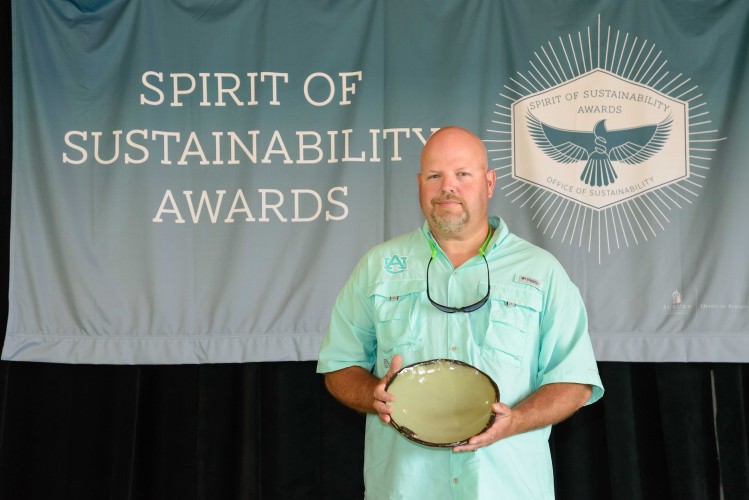Michael Freeman — Staff
Auburn University, Auburn, AL

Michael Freeman humbly accepting his award.
It has been said that you can discern an individual’s priorities (or where their heart lies) by how they spend their time and money. Michael’s priorities reflect the four points of the Sustainability Compass: Nature, Economy, Society, and individual and collective Wellbeing. The sheer amount of time, energy, and support that Michael dedicates to sustainability-focused organizations and initiatives both in his duties as an Auburn employee and in his volunteer activities make it very clear what matters to him.
He has chosen to spend his professional life in positions that enable him to serve others and the environment. Michael has worked at Auburn University in Risk Management and Safety for nearly ten years. On a day-to-day basis he contributes to the overall wellbeing of Auburn University by conscientiously ensuring that hazardous materials are handled safely and responsibly. He has also contributed to watershed management efforts on Auburn’s campus, in particular the initiative to restore Parkerson Mill Creek as a campus amenity.
Water quality is one of Michael’s prime interests and he is an active member/supporter of Alabama Water Watch, Mobile Baykeeper, Alabama Coastal Foundation, and Alabama Rivers Alliance. He is also involved in Auburn Bassmasters, where he is a voice for water quality protection and sustainability.
In addition, Michael supports poverty alleviation organizations such as Bay Aid Franklin County, FL and the Food Bank of East Alabama. He is a volunteer coordinator for the annual “Bo Bikes Bama” event begun by Bo Jackson in response to the 2011 tornados that ravaged Alabama and other states that raises funds for Alabama Emergency Relief.
Michael is a “bridge builder.” His outgoing and amicable personality and values-based approach help him establish new relationships and work with people across a wide range of cultural, social, and political perspectives. As a result, Michael is very effective at bridging differences and creating linkages and partnerships between individuals and organizations, enabling them to work together more effectively in reaching shared goals, a task essential to achieving sustainability. He is passionate and energetic about making a difference when it comes to issues that affect human and environmental health and overall community wellbeing. Michael loves Auburn University, is proud to be a part of it, and strives to make it a better place. He represents the Spirit of Sustainability in ways that other faculty and staff of Auburn University can strive to emulate.




